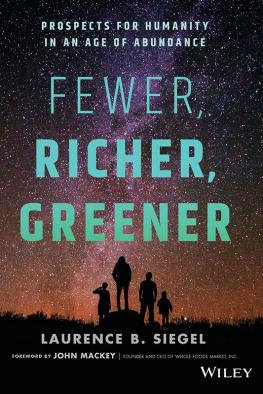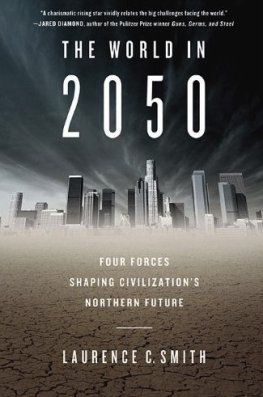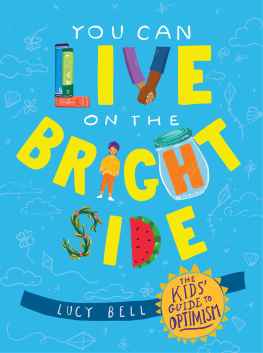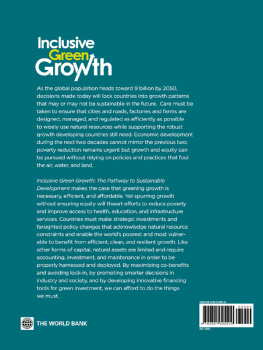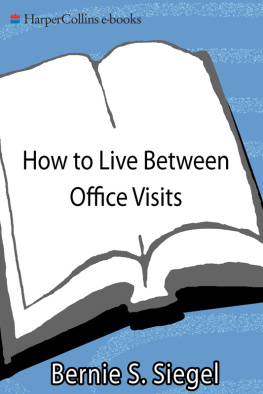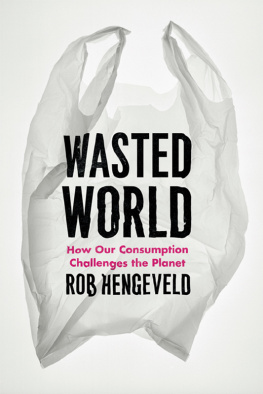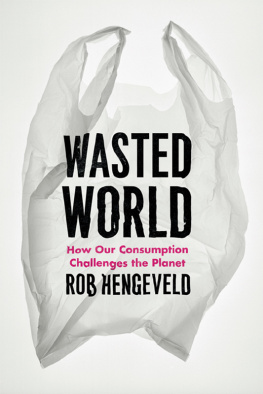
FEWER,
RICHER,
GREENER
PROSPECTS FOR HUMANITY IN
AN AGE OF ABUNDANCE
LAURENCE B. SIEGEL
Cover image: grynold/Shutterstock, grakozy/Unsplash
Cover design: Wiley
Copyright 2020 by Laurence B. Siegel. All rights reserved.
Published by John Wiley & Sons, Inc., Hoboken, New Jersey.
Published simultaneously in Canada.
No part of this publication may be reproduced, stored in a retrieval system, or transmitted in any form or by any means, electronic, mechanical, photocopying, recording, scanning, or otherwise, except as permitted under Section 107 or 108 of the 1976 United States Copyright Act, without either the prior written permission of the Publisher, or authorization through payment of the appropriate per-copy fee to the Copyright Clearance Center, Inc., 222 Rosewood Drive, Danvers, MA 01923, (978) 750-8400, fax (978) 646-8600, or on the Web at www.copyright.com. Requests to the Publisher for permission should be addressed to the Permissions Department, John Wiley & Sons, Inc., 111 River Street, Hoboken, NJ 07030, (201) 748-6011, fax (201) 748-6008, or online at www.wiley.com/go/permissions.
Limit of Liability/Disclaimer of Warranty: While the publisher and author have used their best efforts in preparing this book, they make no representations or warranties with respect to the accuracy or completeness of the contents of this book and specifically disclaim any implied warranties of merchantability or fitness for a particular purpose. No warranty may be created or extended by sales representatives or written sales materials. The advice and strategies contained herein may not be suitable for your situation. You should consult with a professional where appropriate. Neither the publisher nor author shall be liable for any loss of profit or any other commercial damages, including but not limited to special, incidental, consequential, or other damages.
For general information on our other products and services or for technical support, please contact our Customer Care Department within the United States at (800) 762-2974, outside the United States at (317) 572-3993, or fax (317) 572-4002.
Wiley publishes in a variety of print and electronic formats and by print-on-demand. Some material included with standard print versions of this book may not be included in e-books or in print-on-demand. If this book refers to media such as a CD or DVD that is not included in the version you purchased, you may download this material at http://booksupport.wiley.com. For more information about Wiley products, visit www.wiley.com.
NOTE: Any views or opinions represented in this work are personal and belong solely to the author and those quoted or cited. They do not represent those of people, institutions or organizations that they may or may not be associated with in any professional or personal capacity, unless explicitly stated.
Library of Congress Cataloging-in-Publication Data:
Name: Siegel, Laurence B., author.
Title: Fewer, richer, greener : prospects for humanity in an age of
abundance / Laurence B. Siegel.
Description: Hoboken, New Jersey : John Wiley & Sons, Inc., [2020] |
Includes bibliographical references and index.
Identifiers: LCCN 2019035276 (print) | LCCN 2019035277 (ebook) | ISBN
978-1-119-52689-6 (cloth) | ISBN 978-1-119-52693-3 (adobe pdf) | ISBN
978-1-119-52692-6 (epub)
Subjects: LCSH: Economic developmentForecasting. | Economic
historyForecasting. | ProgressForecasting.
Classification: LCC HC59.15 .S5564 2020 (print) | LCC HC59.15 (ebook) |
DDC 330.9001/12dc23
LC record available at https://lccn.loc.gov/2019035276
LC ebook record available at https://lccn.loc.gov/2019035277
Foreword
On Capitalism and Humane True Liberalism
Adam Smith, the eighteenth-century founder of economics, and Milton Friedman, two centuries later, promoted the idea that capitalism improves humanity in a way that cannot be accomplished through any other means. Deirdre McCloskey, the great modern economist, historian, and philosopher, wrote a book that was at first called Humane True Liberalism. (It is now in print under the more prosaic, but still admirable, title of Why Liberalism Works.) It connects capitalism to the ideals of freedom and human autonomy. Rajendra Sisodia and I have written about conscious capitalism in much the same vein.
In this spirit, Larry Siegel, an author trained in finance and economics but now branching out into demography and environmentalism, has written the optimistic book you now hold in your hands. Observing that the end of the population explosion is relatively close at hand, Siegel argues that the whole world (and especially the developing world) has been getting richer and will continue to do so, and that the future will be greener as more resources can be devoted to preserving our precious natural heritage. I think he is right. The future will be better than the present, just as the present is better than the past.
Apocalypse Now... or Apocalypse Not?
This is deeply contrarian stuff. People just love to be told that the world is coming to an end. And they often believe it. Apocalyptic thinking has been a feature of every religion since recorded history began, and that habit of mind persists even in these irreligious times. As a result, a book arguing, as this one does, that economic and living conditions have been steadily improving for hundreds of years and will continue to do so if we dont foul things up, swims against the current. Optimists sound like they are trying to sell you something, while pessimists sound wise and well intentioned.
But Fewer, Richer, Greener is not a statement of blind optimism. It treats challenges like overpopulation, economic stagnation, and climate change as risks to be managed and problems to be solved, rather than existential threats that we cant do anything about. It proposes solutions that may be uncomfortableurbanism, nuclear power, and environmental engineering among thembut will work. Panicking and saying were all going to die will not.
Free Markets and Free Minds
Perhaps the most important fact of which Siegel reminds us is that free markets and free minds are the key to solving the most fundamental problem of human life, which is allocating scarce resources to unlimited wants. This is usually called the economic problem. As the great economist Gary Becker showed, however, this challenge extends far beyond ordinary economic considerations to infiltrate almost every aspect of life. Applying economic thinking to a wide variety of problems opens the mind to insights that cannot be obtained in any other way.
Here are some questions that are amenable to economic thinking although they do not appear to be at first blush: Why do some animals (say, rabbits) have a lot of offspring and devote few resources to each, while others (say, whales) do the opposite? Which kind of animal are we, and is that equilibrium changing? What are the unintended consequences of zoning laws, of gas mileage regulations, of government transfer payments to individuals? Were the Germans who invaded Rome in the fifth century climate refugees? How about the Europeans, from whom Im descended, who invaded the Americas a little over a millennium later?
These are the kinds of questions Siegel raises in a book that asks the reader to remove the constraints on his or her reasoning that come from a lifetime of mainstream thinking and uninspired education. He asks you to engage, instead, in the opposite: unconventional thinkingbolstered by quotes from adventurous philosophers, scientists, and humanists through the millenniaand passionate self-education.
Next page
